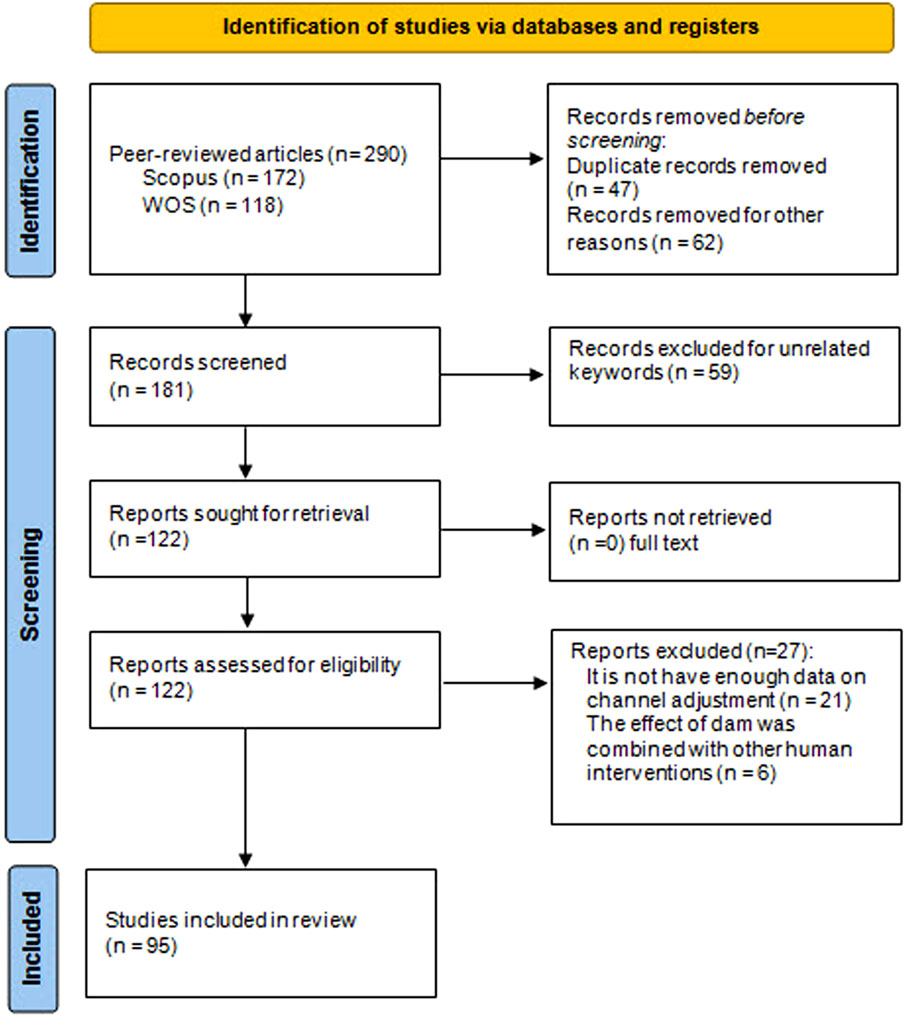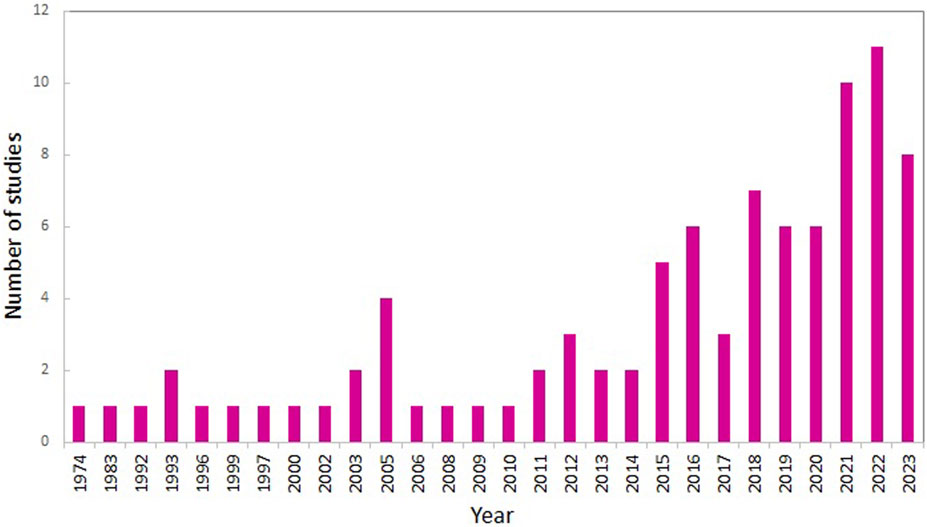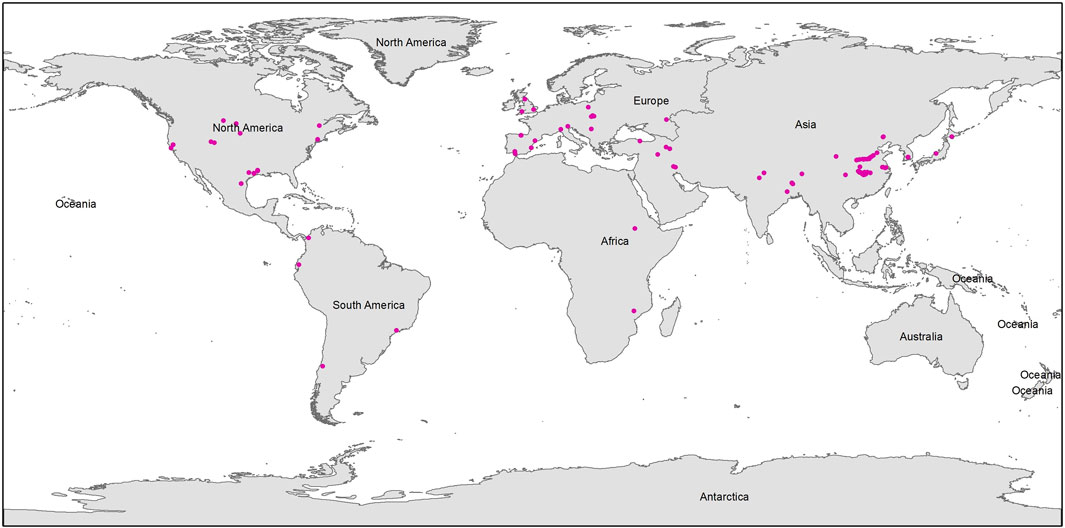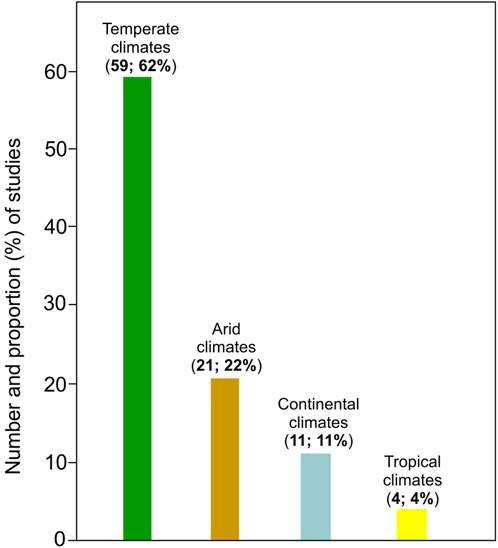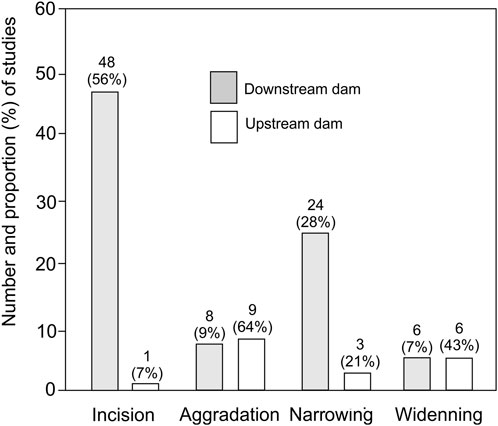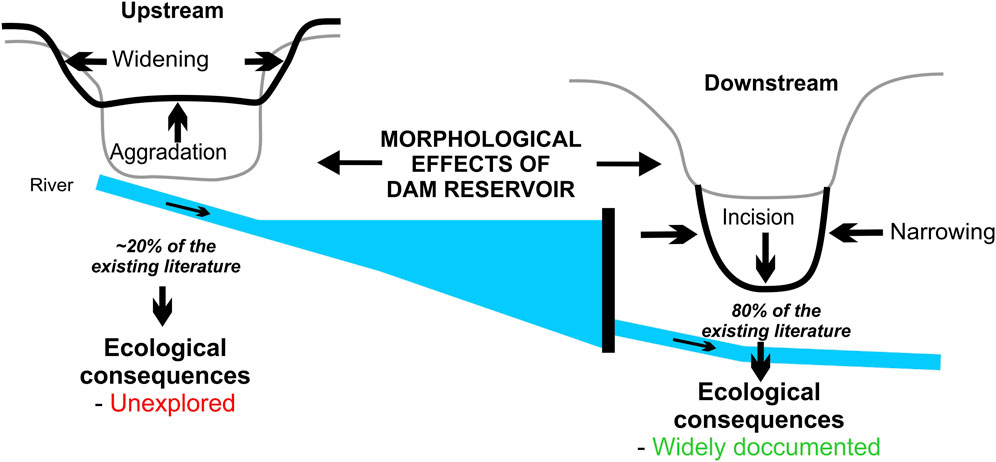- Department of Physical Geography, Faculty of Earth Sciences, Shahid Beheshti University, Tehran, Iran
Despite the extensive knowledge on dam-induced river adjustments, systematic comparisons and integrated syntheses of both upstream and downstream morphological effects are still lacking. In this study, we systematically reviewed all available studies on these adjustments from the SCOPUS and WOS databases. We found that the majority of the 95 analyzed papers (80%) focused exclusively on downstream river channel changes, such as channel incision and narrowing. In contrast, upstream adjustments, including channel widening and aggradation, were addressed in only 16% of the articles, and their associated ecological impacts remain largely understudied. Most of the reviewed studies used remote sensing methods to analyze river morphological adjustments in temperate climates and single-thread rivers. This review highlights the limited understanding of river morphological changes occurring upstream from dams and their ecological consequences. Addressing this gap in further research is crucial for informing future river management practices aimed at mitigating the impacts of dams.
1 Introduction
Dams are one of the oldest man-made infrastructures constructed for flood control, irrigation, water supply and navigation (Zhang and Gu, 2023). These structures can profoundly alter both hydrological and sediment load regimes of rivers (e.g., Williams et al., 1984; Poff et al., 1997; Knighton, 1998; Brandt, 2000; Grant et al., 2003; Nilsson et al., 2005; Graf, 2006; Grant, 2012). While dams have existed for thousands of years, the majority have been constructed in the last 60 years, resulting in around 58,000 large dams currently operating worldwide (Mulligan et al., 2020). The International Commission on Large Dams (ICOLD) defined large dam as “a dam with 15 m or greater in height (measured from the lowest point of foundation to top of dam) or a dam between 5 and 15 m impounding more than 3 million cubic metre” (Zhang and Gu, 2023).
Dams are widely documented as factors triggering diverse morphological adjustments of river channels and floodplains (e.g., Petts, 1979; 1980b; Knighton, 1998; Petts and Gurnell, 2005; Gordon and Meentemeyer, 2006; Takahashi and Nakamura, 2011; Grant, 2012; Ma et al., 2012; Chong et al., 2021), with significant implications for ecological functioning of rivers (Ligon et al., 1995), flood risk in river valleys (Liro et al., 2020; Ma et al., 2022), and bottomland management (Liro, 2019).
These morphological changes are generally categorized into those occurring upstream and downstream of dams (Liro, 2014). The downstream morphological effects of dams (e.g., Brandt, 2000; Petts and Gurnell, 2005; Grant, 2012) are substantially better understood than their upstream counterparts (Liro, 2014; Liro, 2019; Liro et al., 2020). Despite the abundance of research on dam-induced morphological adjustments, a global synthesis comparing upstream and downstream impacts remains lacking. Such a synthesis is critical for building a comprehensive understanding of the historical, current, and projected future consequences of dams on riverine ecosystems. Furthermore, it may guide the development of targeted management strategies for dam-affected river segments, especially those located in regions with additional natural or anthropogenic pressures (e.g., regulated rivers in arid or semi-arid zones). In such systems, dam-induced morphological alterations—such as channel incision—can exacerbate vulnerability to future climate change impacts.
In this study, we conducted a systematic review of existing literature addressing the upstream and downstream morphological effects of dams on rivers. The provided synthesis can help better understand the patterns of dam-induced channel adjustment in various rivers and support future river management to reduce ecological and economic losses resulting from them. Based on the analysis of 95 papers, we: (i) synthesized the dominant patterns of dam-induced morphological changes across global rivers with varying climatic and morphological characteristics, and (ii) identified main knowledge gaps in our recognition of the above problem, suggesting future research directions allowing for narrowing them.
2 Materials and methods
This study was conducted using the principles of the Preferred Reporting Items for Systematic Reviews and Meta-Analyses (PRISMA) (Page et al., 2021) and analyzed all available English-written papers related to the spatial and temporal patterns of dam-induced changes in river channel morphology worldwide.
2.1 Information sources
The review was performed utilizing the SCOPUS and Web of Science (WOS) databases to assess relevant studies published between 1974 and 2023.
2.2 Search strategy
The initial search was conducted using the Boolean operators “AND” and “OR,” combined with keywords related to the subject area, such as “channel morphology (river morphology, channel cross-section, channel erosion, channel aggradation and riverbank erosion, channel degradation, incision, narrowing, widening, bed level),” “dam (reservoir, hydroelectric power plant),” and “hydrology (stream flow, peak flow, discharge, sediment yield, sediment load)” etc. to identify and select papers for review.
2.3 Eligibility criteria
Eligibility of references was determined based on predefined inclusion and exclusion criteria. Only original research articles published in English in peer-reviewed journals focusing on river morphological responses to dam construction were included. Books, conference papers, review articles, and presentations about channel changes were excluded from the study. In the initial research, after removing duplicate papers using EndNote X6, based on the title assessment, some papers were excluded. Subsequently, papers with unrelated topic, duplicate content, and manuscripts with lacking clear methodology, evaluation criteria, or results were also excluded. Importantly, this study focuses exclusively on the effects of dams on river morphology; other anthropogenic influences such as land use changes, mining, or urbanization were not considered.
2.4 Selection process
The preliminary search results were imported into Endnote X6, and duplicates were removed. Two independent authors then screened the titles and abstracts of all the papers and omitted some irrelevant papers based on the eligibility criteria. Afterward, the full texts of the remaining papers were downloaded and thoroughly reviewed to ensure that they meet the criteria for selection. Finally, eligible papers were systematically analyzed to extract relevant data. The following information was collected from each article: fist author, year of publication, river name, geographical location, timeframe of observed changes, dam name, location relative to dam (upstream or downstream), climatic zone, river pattern, data collection method, and observed morphological changes.
Finally, the papers were classified according to type of dam-induced morphological change (e.g., widening, narrowing, deepening, shallowing), position relative to the dam (upstream or downstream), river pattern (single-thread, multi-thread), location of the study area (continent, climatic zone [Köppen-Geiger (https://koeppen-geiger.vu-wien.ac.at/)] and method used for quantifying morphological changes (e.g., topographic measurements, remote sensing material, hydrological data) (see Supplementary Table S1).
3 Results
3.1 Study selection
A combined search of titles, abstracts, and keywords was conducted. First, the literature search was conducted using the SCOPUS database, which resulted in 172 articles found. Then, an additional search was carried out using the Web of Science database, resulting in 118 articles indicated. In total, 290 unique records were identified across both databases (n = 290). Subsequently, the database was reviewed to remove duplicates (n = 47) and articles not directly related to the study topic (n = 62). During the subsequent phase, a total of 181 records were assessed based on the title and abstract content, taking into account the exclusion criteria such as irrelevant keywords (e.g., check dam, other human intervention, experimental and flume studies). As a result, 59 articles were eliminated. The whole texts of the remaining records (n = 122) were evaluated to determine their eligibility. From 122 records, the articles which did not have enough data on river morphological adjustments (n = 21) and those have the effect of dam combined with other human interventions (n = 6) were excluded (n = 27). Finally, 95 articles met all inclusion criteria and were included in the systematic review (Figure 1).
3.2 Publication trend and study location
An analysis of the existing literature revealed a notable increase in the number of publications addressing dam-induced morphological changes between 1974 and 2023 (Figure 2). This is parallel to the increase in dam construction, so that according to Zhang and Gu (2023), over the past three decades, dams have increased especially in developing countries in Asia and South America. The geographic distribution of the 95 reviewed studies is presented in Figure 3. Among these, 57 studies (60%) were conducted in Asia, followed by 16 (17%) in Europe and North America, 4 (4%) in South America, and 2 (2%) in Africa (Table 1). Also, number of the rivers and dams located in countries is shown in Table 1. The most frequently cases are in Asia from China (38 papers), primarily related to the Yangtze and Yellow Rivers (Table 1; Supplementary Table S1). The Yangtze River basin has area of 1.8 × 106 km2 with 6,300 km river length and the Yellow River basin is 752,443 km2 with 3,471 km length (Supplementary Table S2). These rivers are among longest river in the world which have several dams built on them and their tributaries (Supplementary Table S1). Regarding climatic distribution, 59 studies (62%) were conducted in temperate climates, followed by 21 (22%) in semi-arid, 11 (12%) in continental, and 4 (4%) in tropical climates (Figure 4; Supplementary Table S1). Therefore, these studies are scattered across different climatic regions. The Köppen climate classification scheme divides climates into five main climate groups: A (tropical), B (arid), C (temperate), D (continental), and E (polar). Each group and subgroup is represented by a letter. The second letter indicates the seasonal precipitation type, while the third letter indicates the level of heat. According to Supplementary Table S1, the climate of study locations define as: Aw: Tropical wet and dry (savanna climate); BSh: Hot semi-arid climate; BSk: Cold semi-arid climate; Cfa: Humid subtropical climate; Cfb: Temperate oceanic climate or subtropical highland climate; Csa: Hot-summer Mediterranean climate; Csb: Warm-summer Mediterranean climate; Cwa: Monsoon; Dfa: Hot-summer humid continental climate; Dfb: Warm-summer humid continental climate; Dwb: Monsoon-influenced warm-summer humid continental climate.
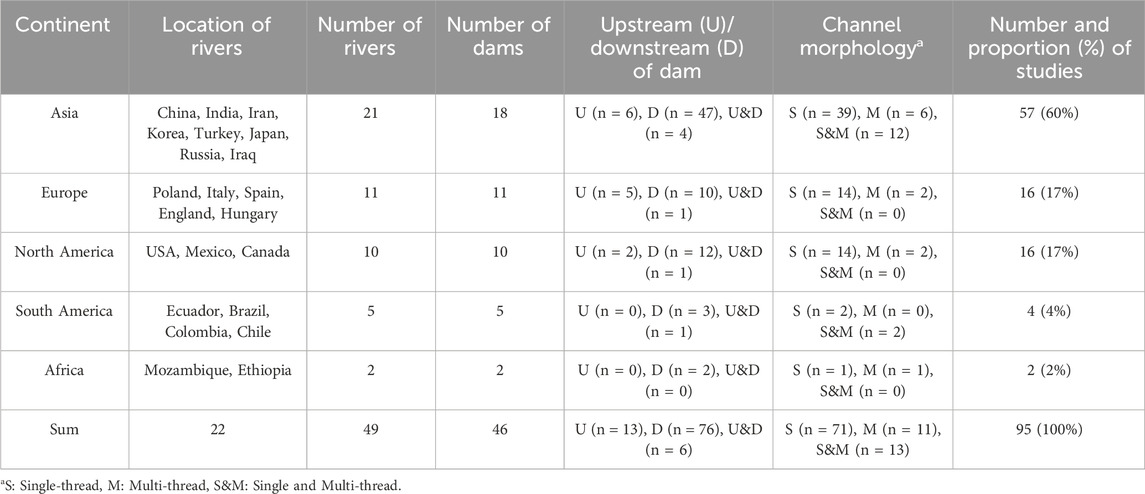
Table 1. The reviewed case studies included reports on the rivers and dam’s location, number, and initial channel morphology.
3.3 Dam-induced morphological changes
A significant proportion of the reviewed studies (76 papers, or 80%) focused on the downstream effects of dams on river morphology, while a significantly smaller number of papers investigated the upstream effects (13 papers, or 14%) or both upstream and downstream effects (6 papers, or 6%) (Table 1). In terms of river types, most studies (71; 75%) were conducted on single-thread channels, while 11 studies (12%) focused on multi-thread systems, and 13 studies (13%) included both types. Most of the studies have been carried out in reaches located in alluvial (76.84%), alluvial and mountainous (10.53%), mountainous (7.37%), alluvial and coastal (3.16%), and coastal plains (2.11%), respectively. The shortest reach studied was 1.5 km upstream of a dam in Smolnik, Poland, while the longest extended 1,300 km downstream along the Lower Yangtze River, China (Supplementary Table S1).
In terms of morphological adjustments, channel incision (48; 56%), narrowing (24; 28%), have been most frequently reported in the river reaches downstream from dams. Narrowing ranged between 10% and 75%. The highest amount of channel narrowing (75%) have been reported by del Tanago et al. (2015) in downstream of Guadalete river in Spain (Supplementary Table S1). This study reach is single-thread in morphology and located at temperate climate (Csa). Also, Wu et al. (2023) stated that channel narrowing (60%) has been occurred in downstream reach of Lower Yellow River as a multi-thread river in temperate climate (Cwa). About bed-level changes, the highest incision over 5 m reported in downstream of the single-thread and multi-thread rivers by Kale and Ataol (2021) in Yeşilırmak (Turkey) and Kondolf and Swanson (1993) in Stony Creek (California). In contrast with downstream, channel widening (6; 32%) and aggradation (9; 47%) have been most frequent reported in the river reaches upstream from dams (Figures 5, 7). The highest channel widening up to 600% has occurred in upstream of Magdalena River in Colombia with tropical climate (Alvarado et al., 2023). Only just few papers about channel aggradation were stated but these papers didn’t report amount of aggradation.
In the case of initially multi-thread rivers located upstream of dams, long-term channel narrowing and pattern simplification have been observed (e.g., Xu, 1990; Xu, 2001; Xu and Shi, 1997), although some channel width fluctuations may occur during the initial phase of adjustment (Liro, 2016). For example, Liro (2015), Liro (2016) reconstructed that in a gravel-bed river, a rise in the downstream base level and the onset (∼first 20 years) of backwater fluctuations in upstream channel sections led to channel widening, driven by accelerated in-channel deposition, bar development, and associated bank erosion.
From river pattern, in the case of downstream-dam reaches a few papers reported a decrease in sinuosity (6 papers) (e.g., Xu, 1990; Morais et al., 2016; Yousefi, et al., 2016; Kale and Ataol, 2021; Alvarado, et al., 2023; Clavijo-Rivera, et al., 2023) and braiding index (4 papers) (e.g., Surian, 1999; Liro, 2017; Kumar, et al., 2019; Kong, et al., 2020), but only one study reported these effects in upstream-dam sections (Supplementary Table S1). Eight papers noted a decrease in bar areas downstream of dams in just a few case studies, including transitions from wandering to single-thread (1 paper), braided to single-thread (1 paper), and braided to wandering (1 paper). For instance, Kumar et al. (2019) found that the Wazirabad Dam in India caused a decline in bar area, a reduced braiding index, and a narrower channel belt downstream of the Yamuna River.
After operation of dam, reducing peak discharges and sediment may lead to changes in lateral channel migration in downstream of dams (e.g., Phillips et al., 2005; Gordon and Meentemeyer, 2006; Musselman, 2011; Smith and Mohrig, 2017; Kong et al., 2020; Liu et al., 2021; He et al., 2022; Goudie, 2022). Also coarsening of channel sediment in downstream of dam was reported in few papers (e.g., Phillips et al., 2005; Smith and Mohrig, 2017; Gao et al., 2021; Yang et al., 2023). In this regard, only one paper by Maselli et al. (2016) stated that in Isola Serafini dam in Italy, lateral migration rate of the channel is up to 45 m/yr upstream of the influence of backwater flow and ca.10 m/yr at the transition from normal to backwater flow conditions (30 km from the dam) and deposition of coarse-grained sediment.
It should be noted that by alteration of hydrology, sediment and morphology, vegetation cover changes. In some cases, sedimentation and encroachment of vegetation in single-thread reaches have been reported as a result of reduced flow downstream of dams (e.g., Choi et al., 2005; Asaeda and Rashid, 2012; del Tanago et al., 2015; Yang et al., 2023). Only Liro et al. (2022) demonstrated that backwater fluctuations of Ro˙znów dam on upstream of Smolnik River substantially disturb the hydrodynamics, which is lead to alterations in sedimentology, morphology, and riparian vegetation pattern. Liro (2019) suggested that changes in the river hydrodynamics and the deposition of fine sediments in upstream of dam, may be the factors triggering vegetation expansion. However, the same factors may eliminate plants that are not resistant to prolonged inundation and high sedimentation rate. Up to now there have been no works presenting a spatial–temporal reconstruction of this process and its relation to the geomorphic characteristics of a given site in the backwater.
These morphological adjustments were most commonly reconstructed using remote sensing materials, including satellite images, aerial photos, and maps (37 papers; 39%), data from field measurements (19; 20%), and historical hydrological data (8; 8%). A high number of works (31; 33%) utilized more than one data collection method (Figure 6). The use of remote sensing techniques has increased significantly in studies from 1992 to 2023. According to Chong et al. (2021), these remote techniques are increasingly replacing field-based approaches to studying geomorphic processes and changes. After gathering data on channel morphology pre and post-dam periods, the researchers have used the statistical analysis and/or hydrological modeling for distingutiong channel changes due to dam construction.
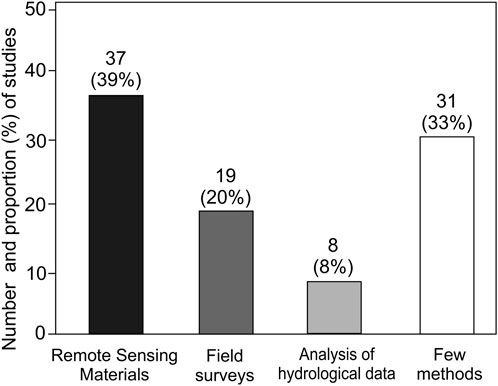
Figure 6. Methods used for collecting data on dam-induced morphological adjustments in the reviewed case studies.
Finally, it is possible that channel changes have environmental and ecosystem effects, but such effects have not been evaluated broadly in the existing studies. However, few of the reviewed papers mentioned ecological and management consequences of channel adjustments in downstream of dams and only one paper mentioned these in upstream. The work of Kondolf and Swanson (1993) in Stony Creek, showed that the change from a braided channel pattern to a more sinuous and meandering channel, probably reflecting an adjustment to abruptly reduced rates of bedload sediment supply from the watershed, to the decrease in flood peaks and sediment transport capacity, and possibly to prolonged bankfull flows. Phillips et al. (2005) has reported intensive bank erosion downstream of dam in Lower Trinity. Sanchis Ibor1 et al. (2018) reported that transformation from wandering to single thread channel pattern in Serpis river was followed by a slow vegetation encroachment, and culminated with the stabilization of channel migration. The role of vegetation has been critical in controlling floods' effectiveness, reducing river mobility and shifting, and consolidating a channel planform model adapted to the post-dam flow conditions. Wu et al. (2018) demonstrated that after construction of Zhikong Reservoir on Lhasa River, the number and area of central bars in the braided reach closest to Zhikong Dam (RS1) were increased because of main channel incision and water level drop. Kale and Ataol (2021) mentioned that river degradation due to the effects of dams on Yeşilırmak River has a major environmental problem at the historical Carşamba Bridge and also along the riverbed of the Yeşilırmak River after dam construction. Agarwal et al. (2022) said that the ability of the Srinagar dam to adjust the sediment load of the event in its upstream is an immediate short-term but it creates a geomorphic disconnect in the channel between upstream and downstream reaches of the reservoir. This disconnect may have a negative effect on sediment–water routing of the river and sediment storage. About upstream, Liro et al., (2022) mentioned that the fluctuation effects of reservoir backwater have caused the change of channel pattern from the multi-thread to the single-thread. This increased the riparian forest expansion in the stream valley and decreased the floodplain utilization potential and caused the development of homogenous and simplified morphological and vegetation patterns.
4 Discussion
A systematic review of published literature reveals that a total of 95 papers have investigated the effects of dams on river channel adjustments globally. However, this number is relatively low when compared to the vast scale of dam construction around the world. This finding is consistent with Chong et al. (2021), who noted that studies addressing geomorphological changes in tropical rivers are scarce, particularly in comparison to research on flow regimes and sediment transport.
The present review shows that most of the studies focused on single-thread rivers and downstream reaches of dams. In terms of location and climate, major studies have been conducted in the Asian rivers and temperate climates. According to Zhang and Gu (2023) Asia hosts the largest number of dams globally (9,526 dams, or 27% of the total). North and South America follow, with 23% and 21% of global dam counts, respectively. Among the Asian case studies, the Yangtze and Yellow Rivers were the most frequently studied, which is unsurprising given the Yangtze’s status as the third-longest river in the world (6,300 km; He et al., 2021) and the location of the Three Gorges Dam (TGD) — the largest dam in the world (Zhang et al., 2016). Despite the extensive studies on dam-induced changes along the Yangtze, major rivers such as the Nile and Amazon etc. remain understudied in this context. Additionally, no case studies were found documenting dam impacts on river morphology in the Oceania continent, a finding aligned with Zhang and Gu (2023), who reported that Oceania has the lowest number of dams globally.
Mainly, large dams have decreased the sediment transporting flows by more than 80%, which has resulted in a much lower capacity to change the channel (del Tanago et al., 2015). According to literature review, narrowing and incision are the dominant process in downstream of dams (Figure 7) (e.g., Surian, 1999; Choi et al., 2005; Jian-guo et al., 2012; Ma et al., 2012; Ashouri et al., 2015; Adib et al., 2016; Gierszewski et al., 2020; Zhou et al., 2021; Han et al., 2018; Wang et al., 2022; Wu et al., 2023). Dams significantly alter river morphology by interrupting sediment transport processes and modifying hydrological patterns, which subsequently transforms downstream channel characteristics. These structures act as sediment traps, creating a “sediment-starved” condition downstream where rivers carry substantially reduced sediment loads. This cleaner water possesses greater erosive energy and enhanced capacity to scour riverbeds and banks. Additionally, dams reduce the geomorphic complexity of river systems by diminishing active channel areas and floodplain extent, while also modifying channel sinuosity and affecting the development and dimensions of sediment deposits. Conversely, upstream areas typically experience channel widening and sediment accumulation as the dominant geomorphological processes.
Our analysis of morphological changes in upstream and downstream reaches of dammed rivers highlights significant differences in both the degree of understanding and the nature of channel adjustments. Morphological changes upstream of dams are significantly less documented than downstream one. The discrepancy in the number of studies between upstream and downstream dam sections can be attributed to the greater spatial extent of downstream dam effects, which range from a few to hundreds of kilometers, compared to the smaller upstream impact, typically from a few to dozens of kilometers (cf. e.g., Williams et al., 1984; Liro et al., 2020). The scientific focus on downstream adjustments largely reflects their pronounced and often negative impacts on river hydromorphology and aquatic ecosystems, as widely documented (Petts, 1979; 1980a; Knighton, 1998; Petts and Gurnell, 2005; Gordon and Meentemeyer, 2006; Takahashi and Nakamura, 2011; Grant, 2012; Ma et al., 2012; Smith et al., 2016; Smith and Mohrig, 2017; Chong et al., 2021). Kondolf (1997) attributes these effects to sediment-starved flows — often described as “hungry water” — which cause severe bed and bank erosion.
Nevertheless, our review reveals a growing interest in upstream effects in recent years (e.g., Xu and Shi, 1997; Maselli et al., 2016; Luo et al., 2018; Volke et al., 2019; Hosseiny and Smith, 2019; Liro et al., 2020; Hamidifar and Nones, 2023). Some studies suggest that these adjustments may have positive effects on specific river hydromorphological characteristics (Liro, 2016; Wiejaczka and Kijowska-Strugała, 2015). It is known that upstream dam adjustments occur over a smaller spatial area than downstream effects. However, some observed changes (e.g., the formation of channel bars in previously incised channels) may compensate for the loss of natural channel forms downstream, especially in regulated rivers (e.g., Surian and Rinaldi, 2003; Wyżga, 2007; Korpak, 2007; Lu et al., 2007; Khaleghi and Surian, 2019). Still, the ecological implications and long-term significance of upstream changes remain poorly understood, especially when compared to downstream effects (Liro, 2019; Liro et al., 2020). Addressing this knowledge gap is essential for developing comprehensive river management and dam impact mitigation strategies.
The literature review reveals that dam impact assessments have employed diverse methodological approaches and analytical tools. However, as noted by Chong et al. (2021), we have entered an era characterized by extensive data collection capabilities and semi-automated geomorphological surveying techniques that offer new opportunities for examining morphological channel transformations. Consistent with Chong et al.'s findings, our review found no studies utilizing high-resolution data sources (such as drone imagery) or implementing repeated topographic surveys through systematic approaches like the Geomorphic Change Detection (GCD) methodology to quantify morphological alterations following dam construction.
Dam-induced channel adjustments have environmental and ecosystem effects, some of the possible positive consequence in upstream are including increased channel-floodplain connectivity, formation of valuable habitats in river channel (bars, channel island) (Wu et al., 2018), decrease of groundwater deficit and potential for protecting rejuvenated habitats and biota (Lobera et al., 2017; Liro et al., 2022), in downstream are potential for controlled increase of the river baseflow during water deficit periods, potential for partly reducing flood peaks (Kondolf and Swanson, 1993). Whereas, the negative effects in upstream are intensive fine sediments deposition on fish habitats, negative effects of prolonged artificial flooding biota and riparian vegetation (Sanchis-Ibor1 et al., 2018), potential for contaminated sediment accumulation, increased flood risk, a need to manage accelerated accumulation of contaminated sediments, a limited potentential for landuse due to artificial flooding (Liro et al., 2022). In terms of downstream, the possible negative effects are decrease in channel-floodplain connectivity, disappearance of habitats connected to sediment presence in river channel (bars, channel island), increase of groundwater defict, negative effects of hydropeaking on river fauna, intensivied bnak erosion resulting from channel incision (Phillips et al., 2005; Kale and Ataol, 2021), increase flood risk resulting from changes in channel geometry. Considering the issues raised and in terms of changes in river morphology caused by the dam, despite some positive ecological and management effects especially upstream of the dam, the negative effects of the dam are numerous, so building the dam is not recommended.
Finally, this work represents the first review about morphological changes of the river due to dam in compare upstream and downstream, worldwide. The study and data turned out to be neither homogeneous nor complete for all the study rivers that affect by dam. Some major limitations of this work are: (i) few data about bed-level changes, especially about channel aggradation, (ii) few case studies in some region that have large river and large dams, and, (iii) not equal and homogeneity in number of studies in different climatic regions. Consequently, providing definitive assessments of how river morphology responds to dam construction across different climatic regions remains challenging. Such comparative analyses are further complicated by variations in dam design specifications and operational parameters, as well as scale-related issues when comparing rivers of different magnitudes. While distinguishing between natural processes and anthropogenic influences (such as dams) on river morphological changes is typically difficult, our understanding of dam-induced channel modifications could be substantially enhanced through additional research efforts.
5 Conclusion
Despite the widespread global human intervention through dam construction, there remains a significant gap in the literature concerning river morphological changes and channel adjustments induced by dams. The majority of existing studies have predominantly focused on the impacts of dams and reservoirs on flow regimes and sediment transport, rather than on channel morphology. Our systematic review highlights distinct patterns of morphological adjustments occurring upstream and downstream of dams. Most studies have concentrated on downstream sections of dam, with considerably fewer studies addressing upstream morphological changes. Nonetheless, the primary downstream responses are channel incision and narrowing, whereas upstream adjustments are characterized mainly by channel widening and aggradation. These findings provide critical insights for assessing the future geomorphic and ecological consequences of dam construction and offer valuable guidance for the management of alluvial rivers influenced by dams. To enhance understanding and promote sustainable river management, future research should broaden their spatial scope beyond Asia and downstream reaches, incorporate emerging remote sensing and analytical technologies, and investigate the ecological implications of upstream morphological changes more comprehensively. It is worth noting that in studying and investigating the effects of dams on channel morphology in future research, two points should be considered. First, the effects of dams should be seen simultaneously with other factors affecting the channel, such as drainage basin conditions (e.g., climate, geology, and land use), and second, the effects of these morphological changes on ecology and management should be examined.
Data availability statement
The original contributions presented in the study are included in the article/Supplementary Material, further inquiries can be directed to the corresponding author.
Author contributions
SK: Supervision, Formal Analysis, Writing – original draft, Writing – review and editing, Software, Data curation, Investigation, Methodology, Project administration, Visualization, Resources, Conceptualization, Validation. KN: Conceptualization, Writing – review and editing, Methodology.
Funding
The author(s) declare that no financial support was received for the research and/or publication of this article.
Acknowledgments
The authors gratefully acknowledge Dr. Esmaeel Saeedy Robat for his valuable assistance and advice during the systematic review process. We also thank Dr. Suiji Wang for kindly providing cross-sectional data of the lower Yellow River reach.
Conflict of interest
The authors declare that the research was conducted in the absence of any commercial or financial relationships that could be construed as a potential conflict of interest.
Generative AI statement
The author(s) declare that no Generative AI was used in the creation of this manuscript.
Any alternative text (alt text) provided alongside figures in this article has been generated by Frontiers with the support of artificial intelligence and reasonable efforts have been made to ensure accuracy, including review by the authors wherever possible. If you identify any issues, please contact us.
Publisher’s note
All claims expressed in this article are solely those of the authors and do not necessarily represent those of their affiliated organizations, or those of the publisher, the editors and the reviewers. Any product that may be evaluated in this article, or claim that may be made by its manufacturer, is not guaranteed or endorsed by the publisher.
Supplementary material
The Supplementary Material for this article can be found online at: https://www.frontiersin.org/articles/10.3389/fenvs.2025.1626165/full#supplementary-material
References
Adib, A., Foladfar, H., and Roozy, A. (2016). Role of construction of large dams on river morphology (case study: the karkheh dam in Iran). Arabian J. Geosciences 9 (15), 661. doi:10.1007/s12517-016-2693-2
Alvarado, D. C., Vargas-Luna, A., and Giraldo-Osorio, J. D. (2023). Upstream and downstream changes in the channel width and sinuosity due to dam construction in tropical Rivers: the case of Colombia. Appl. Sci. 13 (12), 7109. doi:10.3390/app13127109
Ashouri, M., Piry, Z., and Rezaei Moghaddam, M. H. (2015). A comparison of the influence of the sattarkhan reservoir dam on the upstream and downstream of the ahar chai river, NW Iran. Environ. Earth Sci. 73 (8), 4099–4108. doi:10.1007/s12665-014-3695-6
Brandt, S. A. (2000). Classification of geomorphological effects downstream of dams. CATENA 40, 375–401. doi:10.1016/s0341-8162(00)00093-x
Chong, X. Y., Vericat, D., Batalla, R. J., Teo, F. Y., Lee, K. S. P., and Gibbins, C. N. (2021). A review of the impacts of dams on the hydromorphology of tropical Rivers. Sci. Total Environ. 794, 148686. doi:10.1016/j.scitotenv.2021.148686
Clavijo-Rivera, A., Sanclemente, E., Altamirano-Moran, D., and Muñoz-Ramirez, M. (2023). Temporal analysis of the planform morphology of the quevedo river, Ecuador, using remote sensing. J. S. Am. Earth Sci. 128 (7), 104467. doi:10.1016/j.jsames.2023.104467
del Tanago, M. G., Bejarano, M. D., de Jalon, P. G., and Schmidt, J. C. (2015). Biogeomorphic responses to flow regulation and fine sediment supply in mediterranean streams (the Guadalete River, southern Spain). J. Hydrology 528, 751–762. doi:10.1016/j.jhydrol.2015.06.065
Gao, Y., Chen, L., Zhang, W., Li, X., and Xu, Q. X. (2021). Spatiotemporal variations in characteristic discharge in the Yangtze River downstream of the three gorges dam. Sci. Total Environ. 785 (3–4), 147343. doi:10.1016/j.scitotenv.2021.147343
Gierszewski, P. J., Habel, M., Szmanda, J., and Luc, M. (2020). Evaluating effects of dam operation on flow regimes and riverbed adaptation to those changes. Sci. Total Environ. 710 (4), 136202. doi:10.1016/j.scitotenv.2019.136202
Gordon, E., and Meentemeyer, R. K. (2006). Effects of dam operation and land use on stream channel morphology and riparian vegetation. Geomorphology 82, 412–429. doi:10.1016/j.geomorph.2006.06.001
Goudie, A. S. (2022). The impacts of humans on geomorphology. Geol. Soc. Mem. 58 (1), 121–134. doi:10.1144/m58-2020-24
Graf, W. L. (2006). Downstream hydrologic and geomorphic effects of large dams on American rivers. Geomorphology 79, 336–360. doi:10.1016/j.geomorph.2006.06.022
Grant, G. E. (2012). The geomorphic response of gravel-bed Rivers to dams: perspectives and prospects. Gravel-Bed Rivers, 165–181. doi:10.1002/9781119952497.ch15
Grant, G. E., Schmidt, J. C., and Lewis, S. L. (2003). A geological framework for interpreting downstream effects of dams on Rivers, A peculiar river, 203–219.
Hamidifar, H., and Nones, M. (2023). Hydro-morphodynamic responses of rivers to the construction of hydropower dams: a case study – the Kor River, Iran. Hydrological Sci. J. 68, 1567–1577. doi:10.1080/02626667.2023.2230197
Han, J. Q., Sun, Z. H., and Li, Y. T. (2018). Distribution of erosion intensity in the Jingjiang reach influenced by the Three gorges dam. Earth Surf. Process. Landforms 43 (12), 2654–2665. doi:10.1002/esp.4423
He, Z. C., Sun, Z. H., Li, Y. T., Zhao, Q. Y., Hu, Y., and Chen, Z. H. (2022). Response of the gravel-sand transition in the Yangtze River to hydrological and sediment regime changes after upstream damming. Earth Surf. Process. Landforms 47 (2), 383–398. doi:10.1002/esp.5254
Hosseiny, H., and Smith, V. (2019). Two dimensional model for backwater geomorphology: darby Creek, PA. Water 11, 2204. doi:10.3390/w11112204
Kale, M. M., and Ataol, M. (2021). The effects of dams on river channel morphology: a case study at the historical Çarşamba bridge on the yeşilırmak river in northern Turkey. Environ. Earth Sci. 80 (18), 624. doi:10.1007/s12665-021-09935-6
Khaleghi, S., and Surian, N. (2019). Channel adjustments in Iranian Rivers: a review. WaterSwitzerl. doi:10.3390/w11040672
Knighton, D. (1998). Fluvial forms and processes: a new perspective. London, New York: Arnold ; Oxford University Press.
Kondolf, G. M., and Swanson, M. L. (1993). Channel adjustments to reservoir construction and gravel extraction along stony-creek, California. Environ. Geol. 21 (4), 256–269. doi:10.1007/bf00775916
Kong, D., Latrubesse, E. M., Miao, C., and Zhou, R. (2020). Morphological response of the lower yellow river to the operation of xiaolangdi dam, China. Geomorphology 350, 106931. doi:10.1016/j.geomorph.2019.106931
Korpak, J. (2007). The influence of river training on mountain channel changes (Polish carpathian Mountains). Geomorphology 92, 166–181. doi:10.1016/j.geomorph.2006.07.037
Kumar, R., Pandey, V. K., and Sharma, M. C. (2019). Assessing the human role in changing floodplain and channel belt of the yamuna river in national capital territory of Delhi, India. J. Indian Soc. Remote Sens. 47 (8), 1347–1355. doi:10.1007/s12524-019-01018-1
Ligon, F. K., Dietrich, W. E., and Trush, W. J. (1995). Downstream ecological effects of dams. BioScience 45, 183–192. doi:10.2307/1312557
Liro, M. (2014). Conceptual model for assessing the channel changes upstream from dam reservoir. Quaest. Geogr. 33, 61–74. doi:10.2478/quageo-2014-0007
Liro, M. (2015). Gravel-bed channel changes upstream of a reservoir: the case of the dunajec river upstream of the czorsztyn reservoir, southern Poland. Geomorphology 228, 694–702. doi:10.1016/j.geomorph.2014.10.030
Liro, M. (2016). Development of sediment slug upstream from the czorsztyn reservoir (southern Poland) and its interaction with river morphology. Geomorphology 253, 225–238. doi:10.1016/j.geomorph.2015.09.018
Liro, M. (2019). Dam reservoir backwater as a field-scale laboratory of human-induced changes in river biogeomorphology: a review focused on gravel-bed Rivers. Sci. Total Environ. 651, 2899–2912. doi:10.1016/j.scitotenv.2018.10.138
Liro, M., Ruiz-Villanueva, V., Mikuś, P., Wyżga, B., and Bladé Castellet, E. (2020). Changes in the hydrodynamics of a mountain river induced by dam reservoir backwater. Sci. Total Environ. 744, 140555. doi:10.1016/j.scitotenv.2020.140555
Liu, W., Wang, S. J., Sang, Y. F., Ran, L. S., and Ma, Y. Y. (2021). Effects of large upstream reservoir operations on cross-sectional changes in the channel of the lower yellow river reach. Geomorphology 387, 107768. doi:10.1016/j.geomorph.2021.107768
Lobera, G., Andrés-Domenech, I., López-Tarazón, J. A., Millán-Romero, P., Vallés, F., Vericat, D., et al. (2017). Bed disturbance below dams: observations from two mediterranean Rivers. Land Degrad. Dev. 28, 2493–2512. doi:10.1002/ldr.2785
Lu, X. X., Zhang, S. R., Xie, S. P., and Ma, P. K. (2007). Rapid channel incision of the lower pearl river (china) since the 1990s as a consequence of sediment depletion. Hydrol. Earth Syst. Sci. 11, 1897–1906. doi:10.5194/hess-11-1897-2007
Luo, M., Yu, H. L., Huang, E., Ding, R., and Lu, X. (2018). Two-dimensional numerical simulation study on bed-load transport in the fluctuating backwater area: a case-study reservoir in China. Water 10, 1425. doi:10.3390/w10101425
Ma, Y. X., Huang, H. Q., Nanson, G. C., Li, Y., and Yao, W. Y. (2012). Channel adjustments in response to the operation of large dams: the upper reach of the lower yellow river. Geomorphology 147, 35–48. doi:10.1016/j.geomorph.2011.07.032
Ma, C. H., Qiu, D. X., Mu, X. M., and Gao, P. (2022). Morphological evolution characteristics of river cross-sections in the lower weihe river and their response to streamflow and sediment changes. Water 14, 3419. doi:10.3390/w14213419
Maselli, V., Pellegrini, C. C., Bianco, F. D., Mercorella, A., Nones, M., Crose, L., et al. (2016). River morphodynamic evolution under dam-induced backwater: an example from the po river (Italy). J. Sediment. Res. doi:10.2110/jsr.2018.61
Morais, E. S., Rocha, P. C., and Hooke, J. (2016). Spatiotemporal variations in channel changes caused by cumulative factors in a meandering river: the lower Peixe River, Brazil. Geomorphology 273, 348–360. doi:10.1016/j.geomorph.2016.07.026
Mulligan, M., van Soesbergen, A., and Sáenz, L. (2020). Goodd, a global dataset of more than 38,000 georeferenced dams. Sci. Data 7, 31. doi:10.1038/s41597-020-0362-5
Musselman, Z. A. (2011). The localized role of base level lowering on channel adjustment of tributary streams in the trinity River basin downstream of Livingston Dam, Texas, USA. Geomorphology 128 (1-2), 42–56. doi:10.1016/j.geomorph.2010.12.021
Nilsson, C., Reidy, C. A., Dynesius, M., and Revenga, C. (2005). Fragmentation and flow regulation of the world's large river systems. Sci. (New York, N.Y.) 308, 405–408. doi:10.1126/science.1107887
Page, M. J., McKenzie, J. E., Bossuyt, P. M., Boutron, I., Hoffmann, T. C., Mulrow, C. D., et al. (2021). The PRISMA 2020 statement: an updated guideline for reporting systematic reviews. Res. Methods & Report. 372, n71. doi:10.1136/bmj.n71
Petts, G. E. (1979). Complex response of river channel morphology subsequent to reservoir construction. Prog. Phys. Geogr. 3, 329–362. doi:10.1177/030913337900300302
Petts, G. E. (1980a). Implications of the fluvial process-channel morphology interaction below british reservoirs for stream habitats. Sci. Total Environ. 16, 149–163. doi:10.1016/0048-9697(80)90021-2
Petts, G. E. (1980b). Long-term consequences of upstream impoundment. Environ. Conserv. 7, 325–332. doi:10.1017/s0376892900008183
Petts, G. E., and Gurnell, A. M. (2005). Dams and geomorphology: research progress and future directions. Geomorphology 71, 27–47. doi:10.1016/j.geomorph.2004.02.015
Phillips, J. D., Slattery, M. C., and Musselman, Z. A. (2005). Channel adjustments of the lower Trinity River, Texas, downstream of Livingston Dam. Earth Surf. Process. Landforms 30 (11), 1419–1439. doi:10.1002/esp.1203
Poff, N. L., Allan, J. D., Bain, M. B., Karr, J. R., Prestegaard, K. L., Richter, B. D., et al. (1997). The natural flow regime. BioScience 47, 769–784. doi:10.2307/1313099
Smith, V. B., and Mohrig, D. (2017). Geomorphic signature of a dammed Sandy River: the lower Trinity River downstream of Livingston Dam in Texas, USA. Geomorphology 297, 122–136. doi:10.1016/j.geomorph.2017.09.015
Smith, N. D., Morozova, G. S., Pérez-Arlucea, M., and Gibling, M. R. (2016). Dam-induced and natural channel changes in the Saskatchewan River below the E.B. Campbell Dam, Canada. Geomorphology 269, 186–202. doi:10.1016/j.geomorph.2016.06.041
Surian, N., and Rinaldi, M. (2003). Morphological response to river engineering and management in alluvial channels in Italy. Geomorphology 50, 307–326. doi:10.1016/s0169-555x(02)00219-2
Takahashi, M., and Nakamura, F. (2011). Impacts of dam-regulated flows on channel morphology and riparian vegetation: a longitudinal analysis of Satsunai River, Japan. Landsc. Ecol. Eng. 7, 65–77. doi:10.1007/s11355-010-0114-3
Volke, M. A., Johnson, W. C., Dixon, M. D., and Scott, M. L. (2019). Emerging reservoir delta-backwaters: biophysical dynamics and riparian biodiversity. Ecol. Monogr. 89, e01363. doi:10.1002/ecm.1363
Wang, H. Y., Yao, S. M., Lu, Y. J., Zuo, L. Q., Liu, H. X., and Zhao, Z. C. (2022). Morphological changes of sharp bends in response to three gorges project operation at different discharges. Front. Earth Sci. 10, 876631. doi:10.3389/feart.2022.876631
Wiejaczka, Ł., and Kijowska-Strugała, M. (2015). Assessment of the hydromorphological state of C arpathian rivers above and below reservoirs. Water Environ. J. 29, 277–287. doi:10.1111/wej.12082
Williams, G. P., Wolman, M. G., and Wolman, M. G. (1984). Downstream effects of dams on alluvial Rivers. Washington: US Government Printing Office.
Wu, G., Wang, K., Liang, B., Wu, X., Wang, H., Li, H., et al. (2023). Modeling the morphological responses of the yellow river Delta to the water-sediment regulation scheme: the role of impulsive river floods and density-driven flows. Water Resour. Res. 59, e2022WR033003. doi:10.1029/2022wr033003
Wyżga, B. (2007). “20 A review on channel incision in the Polish carpathian rivers during the 20th century,” in Developments in Earth surface processes. Editors H. Habersack, H. Piégay, and M. Rinaldi (Elsevier), 525–553.
Xu, J. X. (1990). Complex response in adjustment of the weihe river channel to the construction of the sanmenxia reservoir. Z. fur Geomorphol. 34, 233–245. doi:10.1127/zfg/34/1990/233
Xu, J. (2001). Modified conceptual model for predicting the tendency of alluvial channel adjustment induced by human activities. Chin. Sci. Bull. 46, 51–56. doi:10.1007/bf03187236
Xu, J. X., and Shi, C. X. (1997). The river channel pattern change as influenced by the floodplain geoecosystem: an example from the Hongshan reservoir. Z. fur Geomorphol. 41, 97–113. doi:10.1127/zfg/41/1997/97
Yang, X. H., Xiong, H. B., Li, D. F., Li, Y. T., and Hu, Y. (2023). Disproportional erosion of the middle-lower Yangtze River following the operation of the Three Gorges Dam. Sci. Total Environ. 859, 160264. doi:10.1016/j.scitotenv.2022.160264
Yousefi, S., Pourghasemi, H. R., Hooke, J., Navratil, O., and Kidova, A. (2016). Changes in morphometric meander parameters identified on the Karoon River, Iran, using remote sensing data. Geomorphology 271, 55–64. doi:10.1016/j.geomorph.2016.07.034
Zhang, A. T., and Gu, V. X. (2023). Global Dam Tracker: a database of more than 35,000 dams with location, catchment, and attribute information. Sci. Data 10, 111. doi:10.1038/s41597-023-02008-2
Zhang, W., Yuan, J., Han, J. Q., Huang, C. T., and Li, M. (2016). Impact of the Three gorges dam on sediment deposition and erosion in the middle yangtze river: a case study of the shashi reach. Hydrology Res. 47, 175–186. doi:10.2166/nh.2016.092
Keywords: systematic review, dam, channel morphology, upstream, downstream
Citation: Khaleghi S and Nosrati K (2025) Uneven understanding of morphological impacts of dams: upstream vs. downstream. Front. Environ. Sci. 13:1626165. doi: 10.3389/fenvs.2025.1626165
Received: 10 May 2025; Accepted: 13 October 2025;
Published: 21 October 2025.
Edited by:
YoonKyung Cha, University of Seoul, Republic of KoreaReviewed by:
Michael Pollock, NOAA Fisheries, United StatesChrysoula Ntislidou, Aristotle University of Thessaloniki, Greece
Copyright © 2025 Khaleghi and Nosrati. This is an open-access article distributed under the terms of the Creative Commons Attribution License (CC BY). The use, distribution or reproduction in other forums is permitted, provided the original author(s) and the copyright owner(s) are credited and that the original publication in this journal is cited, in accordance with accepted academic practice. No use, distribution or reproduction is permitted which does not comply with these terms.
*Correspondence: Somaiyeh Khaleghi, c19raGFsZWdoaUBzYnUuYWMuaXI=
 Somaiyeh Khaleghi
Somaiyeh Khaleghi Kazem Nosrati
Kazem Nosrati